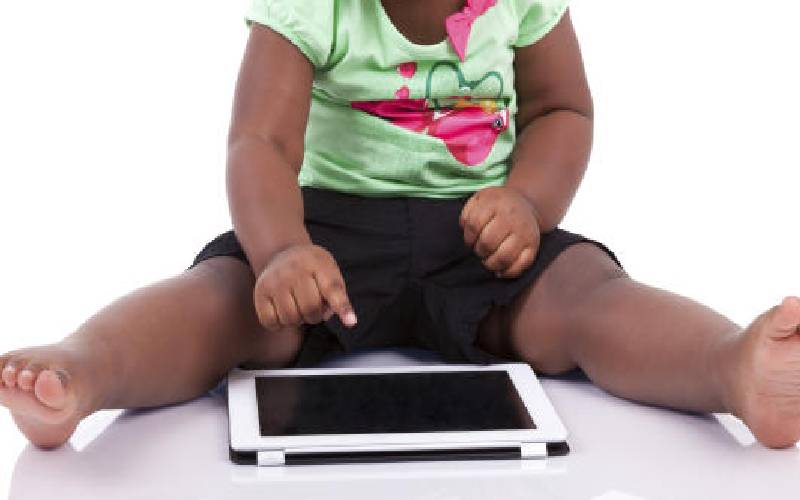
Children who spend a lot of time on digital devices, especially mobile phones, face higher risks of developing cognitive disorders later in life.
This warning from medical experts might exert more pressure on the often shaky relationship between parenting and technology.
Even more worrying is that coronavirus pandemic has provided children with spates of involuntary holidays in which most spent consuming hundreds of combined hours on mobile phones, tablets, television and laptops.
This is even trickier considering most parents, teachers and children now increasingly have to rely on mediated learning through digital classrooms increasing prolonged exposure to screen time.
Dr Michael Mbiriri, a child psychotherapist, now warn that the end result might be “premature thinning of the cortex, the outer layer of the brain, leading to low IQ scores.”
Digital devices have revolutionised the way children learn, interact with the world, communicate, and get entertained.
But Dr Mbiriri notes that children who lead an early digital life end up experiencing language development and reading skills challenges, both of which are requisite components of good IQ scores.
“For you to develop your brain, you need to exercise it in terms of language and reading skills,” says Dr Mbiriri, adding that “engaging in natural activities also increases one’s attention span”.
But for children with early exposure and overuse tend to have a slower development in language which is compounded by the forced solitary life spent buried in the gadgets.
“They also have poor socialisation skills because they do not mingle with their peers, and this also affects their attention span,” he says advising that one of the best ways to counter attention deficit among children is through reading books and outdoor games.
Parents often do not monitor how long children stay on the gadgets, the screen settings of the devices, and the posture the children adopt and particularly the distance from the eyes.
Dr Mbiriri says improper use of the gadgets could cause eye problems, anxiety and even depression, especially for those who are hooked to video games.
Trend pointer to poor parenting
“Some of the video games contain violence and aggression, which may cause anxiety and depression among children. Some of them might have disturbed sleep and also end up being obese from the passive lifestyle,” he warns.
In Kenya, at least 60 per cent of children have access to digital gadgets.
More worryingly, a recent survey by the Communications Authority of Kenya on children and use of cellphones found out that there were over 5,000 new applications for SIM cards by minors in the 10 months between March and December 2020.
“A typical child now spends 20 minutes with their mother and five minutes with their father every day,” says Evelyne Kasina, a family IT consultant, adding that a roundup survey revealed the same kids spent seven hours or over 400 minutes behind screens.
Kasina was quoting American Stephen Covey, but still warns that these trends are worrying as they point to failed parenting. When both parents are unavailable, their children are brought up by TV, tablets and the mobile phones the parents buy them as gifts, or as escapist means of pacifying their inattentions and inadequacies.
“Have conversations with your children. Take interest in what they are doing behind the screen,” says the family IT specialist considering that a lot of child trafficking is happening via social media and gaming platforms, especially during the Covid-19 pandemic.
While technology has been harnessed for social good as mobile telephony is at the centre of ‘Eneza Education’, an initiative to widen access to education in Nairobi’s underserved areas, it has also been used in other outrageous ways.
Like the student in Nakuru who was accused of allegedly killing his teacher for confiscating his mobile phone this January.
But, despite the risks, child experts say that it is hard to completely keep children off the small screens and Martha Sunda, the Child Helpline Kenya executive director, says it is important for children to engage with gadgets, “but this should be done with guidance” as they, for instance, improve children’s motor skills, especially when playing video games as they tend to exercise their fingers. They also help keep children occupied while at the same time minimizing the risk of harm during play.
Sunda’s tip from personal experience: “My children only use the phone when I’m around. There are certain channels I have locked using passwords and they only get to watch them when I’m around.”
 The Standard Group Plc is a multi-media organization with investments in media
platforms spanning newspaper print
operations, television, radio broadcasting, digital and online services. The
Standard Group is recognized as a
leading multi-media house in Kenya with a key influence in matters of national
and international interest.
The Standard Group Plc is a multi-media organization with investments in media
platforms spanning newspaper print
operations, television, radio broadcasting, digital and online services. The
Standard Group is recognized as a
leading multi-media house in Kenya with a key influence in matters of national
and international interest.











